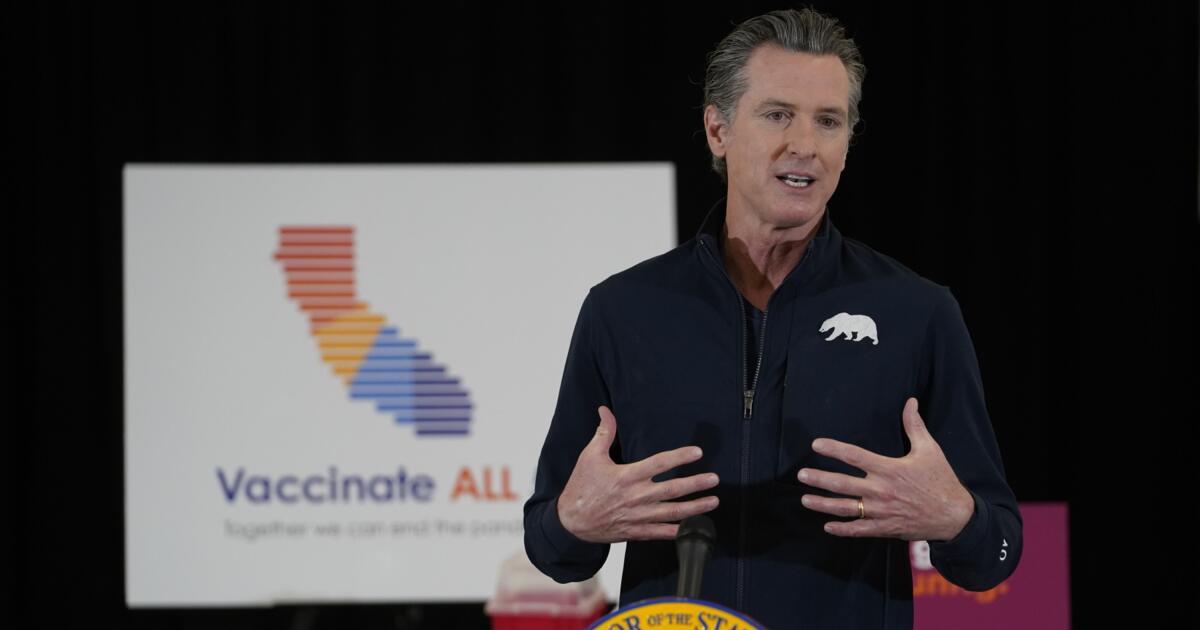Politics
Opinion: Who is House Speaker Mike Johnson? Matt Gaetz’ victory lap says it all

“MAGA Mike’’ won. Which means, alas, so did Rep. Matt Gaetz.
For Gaetz, the smarmy Trump Mini-Me from Florida, and his fellow Republican nihilists — the ones Rep. Kevin McCarthy dubbed “the Crazy 8s” after they forced his firing as House speaker three weeks ago and left Congress in chaos — the House’s surprise election of right-wing Rep. Mike Johnson, a formerly obscure Louisianan (despite his big role working to overturn Donald Trump’s defeat), amounted to sweet, sweet vindication.
Here was Gaetz, chortling on like-minded Steve Bannon’s “War Room” podcast Wednesday morning, in anticipation of Johnson’s election: “If you don’t think that moving from Kevin McCarthy to MAGA Mike Johnson shows the ascendance of this movement and where the power in the Republican Party truly lies, then you’re not paying attention.”
Opinion Columnist
Jackie Calmes
Jackie Calmes brings a critical eye to the national political scene. She has decades of experience covering the White House and Congress.
Gaetz isn’t wrong about that.
McCarthy in his nine-month reign mostly pandered to the nuts, culture warriors and election deniers in his House Republican majority, ever fearful of the coup that finally came after he twice digressed from the extremist path to actually govern — compromising with the Senate and White House first to avoid a debt default and then a government shutdown. But to the right-wingers, the shape-shifting McCarthy was always a poser. (Again, they weren’t wrong.)
At times over the last 22 days, as Republicans proved too riven to pick a new leader, Gaetz and his far-right cohorts had reason to worry that their coup would result in little change at best, and, at worst, that it might backfire.
The House rejected the right’s favorite to replace McCarthy, Ohio Rep. Jim Jordan. Two other Republican nominees, Majority Leader Steve Scalise of Louisiana and Rep. Tom Emmer of Minnesota, were in the McCarthy mold; their candidacies fizzled for lack of support (and, in Emmer’s case, from former President Trump’s drive-by shooting). The humiliating impasse gave rise to talk of some bipartisan arrangement to run the House — MAGA’s worst nightmare.
Gaetz could probably hear what his House Republican enemies, and there are many, would say: “Are you happy now?”
He is of course very happy now that an exhausted and utterly embarrassed Republican caucus united to choose Johnson, only in his fourth House term, to be speaker and second in line to the presidency. Gaetz and Johnson differ big-time in style: Gaetz is in-your-face, Johnson so amiable and nonconfrontational that he is “friend to many and an enemy to none,” as Rep. Elise Stefanik of New York told the House in nominating Johnson. Hence his unlikely elevation.
But in substance, Johnson is little different from Gaetz and his ilk. Johnson has described his relationship with Jordan, mentor to the far right, as “like Batman and Robin.” But Johnson’s politics are more infused with the conservative religiosity he demonstrated in his remarks accepting the speakership. He told the House of his absent wife, “She’s spent the last couple of weeks on her knees in prayer to the Lord. And, um, she’s a little worn out.”
Johnson’s opposition to abortion — he favors a national ban — and to same-sex marriage and LGBTQ+ rights and protections is well documented in his pre-Congress work as an attorney for the socially conservative Alliance Defending Freedom. After the Dobbs decision overturned the constitutional right to an abortion, Johnson suggested that now women would produce more “able-bodied workers,” whose payroll tax contributions would help save Medicare and Social Security.
CNN reported on editorials Johnson wrote in his hometown Shreveport, La., paper, in which he called homosexuality “inherently unnatural” and a “dangerous lifestyle” that ultimately could end “the entire democratic system.” He claimed in 2004, “Experts project that homosexual marriage is the dark harbinger of chaos and sexual anarchy that could doom even the strongest republic.”
Then there’s his behind-the-scenes legal work after the 2020 presidential election to challenge electoral votes in pro-Biden states. The New York Times, after an investigation of Republicans’ post-election machinations, called Johnson “the most important architect of the Electoral College objections.” He enlisted most of his fellow House Republicans in support of a brief to the Supreme Court, yet the justices declined to take the underlying case.
Late Monday night after his nomination as speaker, Johnson joined other Republicans surrounding him in laughing at a reporter who’d had the temerity to ask about his “effort to overturn the 2020 election results.” At his side, Rep. Virginia Foxx of North Carolina yelled “Shut up! Shut up!” Johnson, ever smiling, turned to another reporter for a question.
He is indeed the “smiling seditionist,” as longtime Republican strategist Mike Murphy posted on X. But he’s got plenty of company in the House he now leads. In the runup to the House vote on Johnson, Democratic Rep. Pete Aguilar of California noted Johnson’s role in trying to overturn a free and fair election. A Republican yelled out, “Damn right!”
So, yes, Gaetz is celebrating; his dethroning of McCarthy led to the seating of a fellow MAGAt. But Democrats are feeling celebratory, too.
In the 2022 midterm elections, two issues — abortion rights and democracy protection — mobilized many voters to elect more Democrats and far fewer Republicans than both parties expected. Democrats are counting on the same issues to work for them in 2024.
And with Johnson on the wrong side of both as far as most Americans are concerned, look for Democrats to make MAGA Mike an albatross around House Republicans in swing districts. As one called out to a vulnerable Republican after he voted for Johnson, “Bye-bye!”

Politics
This Tiny Fish’s Mistaken Identity Halted a Dam’s Construction

For such a tiny fish, the snail darter has haunted Tennessee. It was the endangered species that swam its way to the Supreme Court in a vitriolic battle during the 1970s that temporarily blocked the construction of a dam.
On Friday, a team of researchers argued that the fish was a phantom all along.
“There is, technically, no snail darter,” said Thomas Near, curator of ichthyology at the Yale Peabody Museum.
Dr. Near, also a professor who leads a fish biology lab at Yale, and his colleagues report in the journal Current Biology that the snail darter, Percina tanasi, is neither a distinct species nor a subspecies. Rather, it is an eastern population of Percina uranidea, known also as the stargazing darter, which is not considered endangered.
Dr. Near contends that early researchers “squinted their eyes a bit” when describing the fish, because it represented a way to fight the Tennessee Valley Authority’s plan to build the Tellico Dam on the Little Tennessee River, about 20 miles southwest of Knoxville.
“I feel it was the first and probably the most famous example of what I would call the ‘conservation species concept,’ where people are going to decide a species should be distinct because it will have a downstream conservation implication,” Dr. Near said.
The T.V.A. began building the Tellico Dam in 1967. Environmentalists, lawyers, farmers and the Cherokee, whose archaeological sites faced flooding, were eager to halt the project. In August 1973, they stumbled upon a solution.
David Etnier, a dam opponent and a zoologist at the University of Tennessee, went snorkeling with students in the Little Tennessee River at Coytee Spring, not far from Tellico. There, they found a fish on the river bottom that Dr. Etnier said he had never seen before, and he named it the snail darter.
The fish became a “David” to pit against “Goliath” — because if it were to be protected under the Endangered Species Act, the dam’s construction would be blocked.
“Here’s a little fish that might save your farm,” Dr. Etnier told a local farmer, according to the book “The Snail Darter and the Dam,” by Zygmunt Plater, an emeritus law professor at Boston College.
Elected officials were eager to finish the dam, and grew increasingly frustrated.
“This two-inch fish, which surely kept the lowest profile of all God’s creatures until a few years ago, has been the bane of my existence and the nemesis of what I fondly hoped would be my golden years,” Senator Howard H. Baker Jr., of Tennessee said about the snail darter in 1979.
That year, Representative John Duncan Sr., a Tennessee Republican, also described the snail darter as a “worthless, unsightly, minute, inedible minnow.”
After the Supreme Court upheld the protection of the snail darter, President Jimmy Carter signed a bill that exempted the Tellico Dam from the Endangered Species Act. The dam began operating in 1979.
Jeffrey Simmons, an author of the study who formerly worked as a biologist at the T.V.A., discovered what appeared to be snail darters in 2015 on the border of Alabama and Mississippi, far from the Tellico Dam.
“Holy crap, do you know what this is?” Mr. Simmons said to a colleague in the creek that day.
Mr. Simmons knew it shouldn’t be there if it were truly a snail darter.
Ava Ghezelayagh, now at the University of Chicago, and colleagues conducted analysis of the fish’s DNA and compared snail darter physical traits with other fish. That led to confirmation that it was a match with the stargazing darter.
Dr. Plater, who also argued successfully for the fish in the Supreme Court case, took issue with the Yale study. He said the approach favored by Dr. Near and colleagues makes them genetic “lumpers” instead of “splitters,” meaning they reduce species instead of making more. He believes the findings also lean too heavily on genetics.
“Whether he intends it or not, lumping is a great way to cut back on the Endangered Species Act,” Dr. Plater said of Dr. Near.
Dr. Near said being described as a “lumper” was a pejorative in his world, and he added that most of the research he and colleagues had performed had resulted in speciation splits, including a 2022 study.
“The work strengthens the Endangered Species Act, because it shows how science can be revised with additional information and newer perspectives,” he said. “The methods we use in this study are leading to the discovery of scores of new species, many of which are more endangered.”
Decades after the Tellico Dam battle, the fish formerly known as the snail darter is thriving. It left the endangered species list in 2020.
“This is still a success story,” Mr. Simmons said. “Its listing under the Endangered Species Act worked, regardless of what you call this fish.”
While Mr. Duncan died in 1988, his son, former Representative John J. Duncan Jr., known as Jimmy, said his father would have felt vindicated.
“He felt the project should have never been stopped by that little snail darter,” he said.
Politics
Federal courts will not make criminal referrals to DOJ over separate ethics complaints against Justice Thomas

Separate ethics complaints filed by members of Congress and an advocacy group against Justices Clarence Thomas and Ketanji Brown Jackson will not be referred to the Justice Department, federal court officials announced.
The U.S. Judicial Conference said Thomas has agreed to follow updated guidelines on listing free private travel and gifts from friends, following previous reporting on undisclosed hospitality.
For her part, Jackson has amended her financial disclosures following complaints about her husband’s consulting income as a physician.
Democratic Sens. Sheldon Whitehouse (D-RI) and Ron Wyden (D-OR), along with Rep. Hank Johnson (D-GA), had asked for an investigation by the judiciary itself into undisclosed hospitality provided to Thomas by billionaire friend Harland Crow. ProPublica reported on several instances of private travel and lodging over the years.
SUPREME COURT CHEIF JUSTICE ROBERTS ISSUES WARNING ON ‘JUDICIAL INDEPENDENCE’ WEEKS BEFORE TRUMP’S INAUGURATION
Judge Robert Conrad, who heads the judicial conference policymaking body, said in letters to the lawmakers that Thomas had filed amended financial disclosures “that address several issues identified in your letter.”
Additionally, Conrad said that it was not clear whether the judiciary itself could make criminal referrals against a sitting Supreme Court member.
“Because the Judicial Conference does not superintend the Supreme Court and because any effort to grant the Conference such authority would raise serious constitutional questions, one would expect Congress at a minimum to state any such directive clearly. But no such express directive appears in this provision,” Conrad said.
DEPARTMENT OF JUSTICE SPENT OVER $100 MILLION ON DEI EDUCATION PROGRAMS OVER LAST FOUR YEARS
The U.S. Supreme Court is seen during sunset. (Aaron Schwartz/SIPA USA)
Conrad noted that Whitehouse and Wyden had separately asked Attorney General Merrick Garland to name a special counsel to investigate then-former President Donald Trump. Garland has not acted yet on that request.
Whitehouse, in a statement, criticized the Judicial Conference’s decision.
“By all appearances, the judicial branch is shirking its statutory duty to hold a Supreme Court justice accountable for ethics violations,” said Whitehouse.
The complaint filed against Jackson came from Citizens for Renewing America, led by Russ Vought, who was nominated by President-elect Trump to lead the Office of Management and Budget.
Questions over ethics, including unreported private travel by some justices, have led the court to adopt its first code of ethics last year.

United States Supreme Court (front row L-R) Associate Justice Sonia Sotomayor, Associate Justice Clarence Thomas, Chief Justice of the United States John Roberts, Associate Justice Samuel Alito, and Associate Justice Elena Kagan, (back row L-R) Associate Justice Amy Coney Barrett, Associate Justice Neil Gorsuch, Associate Justice Brett Kavanaugh and Associate Justice Ketanji Brown Jackson pose for their official portrait at the East Conference Room of the Supreme Court building on October 7, 2022 in Washington, DC. The Supreme Court has begun a new term after Associate Justice Ketanji Brown Jackson was officially added to the bench in September. ((Photo by Alex Wong/Getty Images))
However, compliance is left to each of the nine justices, leading to concerns the court is not taking its own ethics enforcement standards seriously.
A two-year investigation by Senate Democrats released last week found additional luxury travel by Justice Thomas in 2021 was not noted on his annual financial disclosure form.
Fix the Court, a group which advocates for greater judicial transparency, urged Congress to act.
“The Conference’s letters further underscore the need for Congress to create a new and transparent mechanism to investigate the justices for ethics violations since the Conference is unwilling to act upon the one method we had presumed existed to do that,” said Executive Director Gabe Roth.
Politics
Newsom aims to limit unhealthy food in California, getting ahead of Trump administration and RFK Jr.

Gov. Gavin Newsom issued an executive order on Friday attempting to limit access to ultra-processed foods, a directive he cast as a continuation of California’s “nation leading” nutrition and health standards.
“The food we eat shouldn’t make us sick with disease or lead to lifelong consequences,” Newsom said in a statement. “California has been a leader for years in creating healthy and delicious school meals, and removing harmful ingredients and chemicals from food. We’re going to work with the industry, consumers and experts to crack down on ultra-processed foods, and create a healthier future for every Californian.”
The order directs state agencies to develop recommendations to limit the health harms of ultra-processed foods and calls for proposals to reduce the purchase of candy, soda and other unhealthy foods made with synthetic dyes or additives by recipients of government food benefits.
The move comes weeks before President-elect Donald Trump is sworn into office for his second term, with iconoclastic former environmental lawyer Robert F. Kennedy Jr. as his nominee for secretary of Health and Human Services. Kennedy still needs to be confirmed by the Senate, but he has been a vocal critic of ultra-processed foods and promised to radically overhaul the country’s food system. Food dyes, pasteurized milk and seed oils are among the common items he has criticized, sometimes making health claims that are not backed up by science.
Though Newsom didn’t mention Kennedy, the Democratic governor of California is planting a preemptive flag around the issue and signaling his refusal to concede the terrain to the incoming Trump administration. His executive order included a long list of steps the state has taken to improve nutrition.
Processed foods are foods altered from their natural form, like frozen vegetables, whereas ultra — or highly —processed foods are foods that have been significantly altered from their natural state, like packaged chips or soft drinks. Ultra-processed foods make up the vast majority of the U.S. food supply, research shows.
The Golden State has indeed been a national leader in banning food additives, with Newsom signing a 2023 bill that made California the first state in the nation to prohibit four additives found in popular cereal, soda, candy and drinks.
The California Food Safety Act was colloquially referred to as the “Skittles ban” before its passage because an earlier version of the bill also targeted titanium dioxide, which is used to color Skittles and several other popular candies. But the final law was amended to remove reference to the substance, solely banning brominated vegetable oil, potassium bromate, propylparaben and red dye No. 3.
Last year, Newsom signed a separate bill into law that bars snack foods containing a number of synthetic food dyes from California public schools. That law will prevent popular snack foods like Flamin’ Hot Cheetos from being stocked in school vending machines or cafeterias when it goes into effect on Dec. 31, 2027.
Laws to protect students from sugary drinks go back decades: In 2009 California banned all K-12 schools from offering soda.
The governor’s order cites the link between “ultra-processed foods” and cancer, obesity, diabetes and other health problems. The order says the U.S. allows more than 10,000 chemicals in food, color additives, or ingredients, compared to 300 that are allowed in the European Union.
Newsom is requiring the California Department of Public Health to provide recommendations by April 1 to limit the harms associated with ultra-processed foods and food ingredients that pose a health risk, which may include warning labels. He tasked the Californa Department of Social Services to issue recommendations to reduce the purchase by California food-stamp users of soda, candy, other ultra-processed foods, or foods made with synthetic food dye or additives on the same timeline.
Among several health directives, his order also requires state agencies to identify areas to increase standards for healthy school meals and to investigate the negative health consequences of food dyes.
Ultra-processed foods will likely be at the forefront of the national discourse in the coming weeks as Kennedy prepares for his Senate confirmation hearing.
Kennedy, a prominent anti-vaccine activist, has promoted a number of false health claims and fringe conspiracy theories. But his positions against food additives have also brought support from unlikely bedfellows who have criticized other parts of his “Make America Healthy Again” agenda.
“Yes, there are some things that he supports that we would agree with, but they feel more like the stopped clock that’s right twice a day,” Dr. Peter Lurie, president and executive director of the Center for Science in the Public Interest, said in an earlier interview with The Times — citing food additives as one example.
Lurie characterized Kennedy’s potential appointment more broadly as a dangerous choice because of his inability “to discern the difference between good and bad science.”
The Food and Drug Administration — the agency perhaps most publicly in Kennedy’s crosshairs — could be significantly impacted by his leadership if he is confirmed by the Senate.
The agency, which falls under the the Department of Health and Human Services, has a massive purview, regulating about 77% of the U.S. food supply and overseeing the safety of nearly $4 trillion worth of food, tobacco and medical products, according to federal data.
-

 Business1 week ago
Business1 week agoOn a quest for global domination, Chinese EV makers are upending Thailand's auto industry
-

 Health6 days ago
Health6 days agoNew Year life lessons from country star: 'Never forget where you came from'
-
/cdn.vox-cdn.com/uploads/chorus_asset/file/24982514/Quest_3_dock.jpg)
/cdn.vox-cdn.com/uploads/chorus_asset/file/24982514/Quest_3_dock.jpg) Technology6 days ago
Technology6 days agoMeta’s ‘software update issue’ has been breaking Quest headsets for weeks
-

 World1 week ago
World1 week agoPassenger plane crashes in Kazakhstan: Emergencies ministry
-

 Politics1 week ago
Politics1 week agoIt's official: Biden signs new law, designates bald eagle as 'national bird'
-

 Business3 days ago
Business3 days agoThese are the top 7 issues facing the struggling restaurant industry in 2025
-

 Politics1 week ago
Politics1 week ago'Politics is bad for business.' Why Disney's Bob Iger is trying to avoid hot buttons
-

 Culture3 days ago
Culture3 days agoThe 25 worst losses in college football history, including Baylor’s 2024 entry at Colorado














